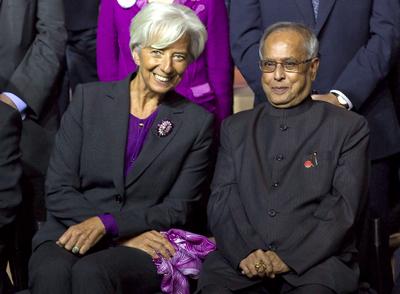However, Asia’s current influence is not yet commensurate with its economic weight in the International Monetary Fund (IMF), arguably the premier institution in global finance.
Asia’s relationship with the IMF before the Asian financial crisis of 1997–1998 can be best characterised as cool, but not hostile. The main interaction between them was in the context of annual Article IV Consultations and the IMF’s advice on economic policies was broadly considered useful by Asian countries, although there was no imperative to follow it.
The picture changed dramatically after the crisis hit Asia and the mode of interaction changed from annual consultations to adjustment programs with the IMF. This new relationship between the IMF and Asia had a rocky start and the Asians became increasingly antagonistic towards the IMF. This hostility persisted for a number of years and well after the IMF programs themselves had ended.
The main reason for the breakdown in the relationship was Asian countries’ unhappiness with the macroeconomic and structural conditionality associated with the IMF’s programs that were negotiated with Thailand (August 1997), Indonesia (November 1997, August 1998) and Korea (December 1997). The conditionality contained in these programs was seen as overly harsh and intrusive and this soured the relationship. Asian countries were convinced that the IMF had misdiagnosed the problems they were facing and had imposed excessive and inappropriate conditionality on the financing it was providing. It is noteworthy that the IMF later acknowledged the mistakes it made, which presumably gave the Asian countries some degree of satisfaction.
There are now signs that the relationship is improving, as seen in the context of the global financial crisis in 2008–2009. While Asian countries made it perfectly clear that they would not again engage in adjustment programs of any type with the IMF, there was Asian support for the IMF in its borrowing arrangements and in quota increases, from which Asian countries stood most to benefit.
Historically, Asia has had a less prominent position in the governance of the IMF than either Europe or the United States. Despite periodic review, the adjustment of quotas and voting shares for member countries has lagged far behind changes in relative economic position, which has operated to the disadvantage of the fast-growing countries of East Asia, in particular. There was a concerted effort over the last decade to redress this discrepancy and this effort has produced significant results. The combined quotas of ASEAN+3 represent 15.7 per cent of total quotas and their votes comprise 15.2 per cent of total votes. If ASEAN+3 voted as a bloc, it could now exercise a veto over decisions requiring the supermajority of 85 per cent, much as the US can do acting by itself.
Furthermore, it is worth noting that the ASEAN+6 countries — including Australia, New Zealand and India — collectively command almost 20 per cent of quotas and 19.2 per cent of votes. Although Asian representatives are now becoming more assertive, when the chips are down, some Asian countries have still been reticent in pushing a unified Asian agenda in the IMF.
The process of selecting the managing director of the IMF is a case in point. Asian governments are sometimes frustrated that the United States and European countries have a ‘lock’ on the positions of the president of the World Bank and the managing director of the IMF — an informal arrangement referred to as the ‘convention’. This convention should be broken and these appointments should go to the best-qualified candidates. Because regional diversity is an important consideration, a non-European will sometimes be the best candidate in the case of the IMF and a non-American will sometimes be the best candidate in the case of the World Bank. This does not necessarily mean that the managing director must be Asian, but Asia has a strong claim to this position as the world’s fastest-growing region with large lending commitments to the IMF.
Yet Asian officials have not competed with much determination for this position and, unless they do, Asian governments cannot legitimately complain about the convention. Not since 1999 has there been a formally declared Asian candidate for the managing director post. During the round in June 2011, several Asian names were mentioned for the position but none was nominated.
Asian countries’ reservations about the IMF have led ASEAN+3 to develop regional arrangements, principally the Chiang Mai Initiative Multilateralisation (CMIM) and the ASEAN+3 Macroeconomic Research Office (AMRO) for crisis financing and economic surveillance. These arrangements change the international financial architecture for the region in important ways. Yet despite the hopes of some, they cannot be relied upon alone to provide financial stability; instead, they will have to work with the IMF for the time being.
Asia’s role in the IMF to date has been limited. Given the size and strength of Asia in the global economy, it is evident that the region ‘punches below its weight’. This is partly the result of a conscious choice by Asian countries to keep the IMF at arm’s length, reflecting bitter memories of the IMF’s role in the Asian financial crisis. But it is also due to the fact that, at least until recently, Asia has not pushed to have a larger say in global financial circles, but has chosen instead to develop its own regional arrangements and institutions. But playing its rightful role in the IMF need not detract from regional arrangements. The global and regional institutions can easily work together in a complementary way.
Mohsin Khan is a Senior Fellow at the Peterson Institute for International Economics and was formerly Director of the Middle East and Central Asia Department at the International Monetary Fund (IMF).
This article appeared in the most recent edition of the East Asia Forum Quarterly, ‘Asia’s global impact‘.

